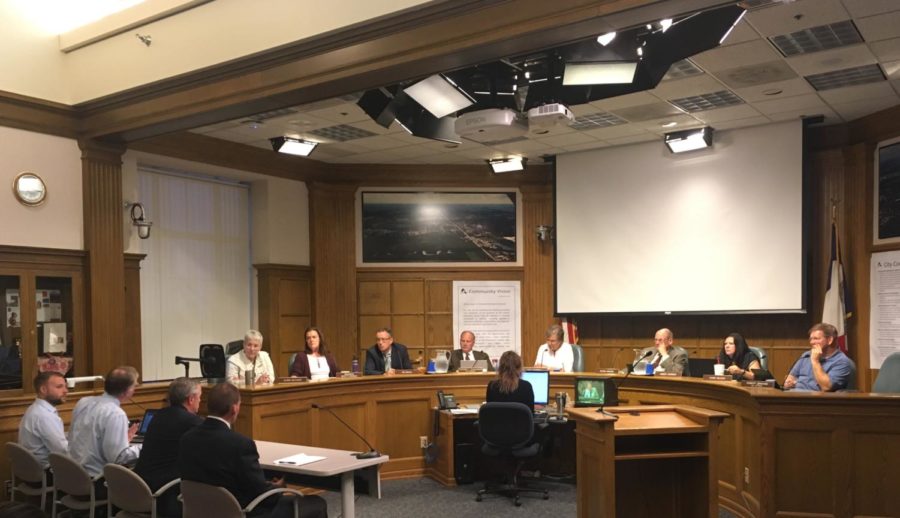- App Content
- App Content / News
- News
- News / Politics And Administration
- News / Politics And Administration / Campus
Council motions for rental occupancy to be based on bedrooms, parking spaces
October 24, 2017
The Ames City Council motioned for the staff to draft an ordinance that would restrict rental occupancy on the number of bedrooms in a rental property that would be capped at five adults.
The ordinance is part of the council’s attempt to better address rental-occupied housing in Ames after the issue made its way to the forefront this fall due to a state law passed this previous legislative cycle.
Currently, Ames restricts the occupancy of a rental house to three non-familial individuals. Due to the state law that will take effect Jan. 1, 2018, Ames may no longer do this.
Additionally, the council motioned for the staff to include that there must be off-street parking per bedroom and that no new parking may be added — this means utilizing existing spaces such as the driveway, garage and previously built parking pads.
The council also requested the city staff give options on the possibility of restricting bedroom additions to rentals, as well as what penalties for code violations might look like, Airbnb in Ames and the issue of unregistered rental properties.
To restrict occupancy on the number of bedrooms came as a sigh of relief for students and landowners, and as a compromise for neighborhood associations.
For Robert Bingham, city council ex-officio and Iowa State student, he was relieved that the council moved away from its initial draw to restrict rental occupancy based on student status.
“It was highly discriminatory,” Bingham said. “Now it’s based upon bedrooms and based upon parking, which is far less discriminatory and will ultimately help students.”
However, Bingham is slightly concerned with the long-term impact of the off-street parking regulation.
“I do agree with Councilman [Peter] Orazem that it will limit negative externalities in regard to street parking and congestion in Campustown,” Bingham said. “I think there should be more wiggle room than a strict one to one … but we will see how that plays out.”
Other voices present during the council meeting Tuesday included the South Campus Area Neighborhood Association [SCAN], which has been highly active in proposing to the council what they feel the next best steps are and should be.
Sandra McJimsey, who represented SCAN, suggested the council restrict occupancy based on number of bedrooms as long as that number is “frozen” on Jan. 1, 2018 when the ordinance would take effect.
This suggestion comes at a compromise of the association, which is concerned about the percentage of rental-occupied units in its neighborhood. The association was also the one to initially propose the student restriction during a September council meeting.
“Landlords have pressed for bedrooms to determine occupancy,” McJimsey said. “We will agree to that, but only if the number is frozen.”
Additionally, the association requested the city further investigate a rental percentage cap overlay in neighborhoods near Iowa State, including SCAN.
Currently, North SCAN is 36 percent rental occupied, according to a staff report by the city. SCAN is suggesting this be reduced to 25 percent.
Others present during the council meeting stressed that the city may be moving too fast, including Ames rental stakeholders Steve Bock and Kelli Excell.
Separately, the two argued that city council slow down in its decision-making process and recognize the benefits of the students to Ames.
Excell said she feels the city is hurting students more than they are helping them as students are being displaced to newer, more expensive properties because of occupancy restrictions on rentals.
“The reason I really want to promote a cause to pause is because there are roughly 36,000 students at Iowa State and we are talking about a small number of students that cause the problems we are trying to avoid … Does that have anything to do with how many people are living in the rooms? House?” Excell said.
Bock argued that it all falls back to the issue of better enforcement.
“Some of the issues — believe it or not — are not students … issues that are out there could be anyone in the community,” Bock said.
As far as other legislation addressed during the meeting, the council approved a six-month moratorium on the ability to issue rental letters of compliance in specific neighborhoods surrounding the university.
These neighborhoods include South Campus Area Neighborhood (SCAN), West Side, Oakwood Forest, Old Edwards, College Creek, Colonial Village and Oak Riverside.







